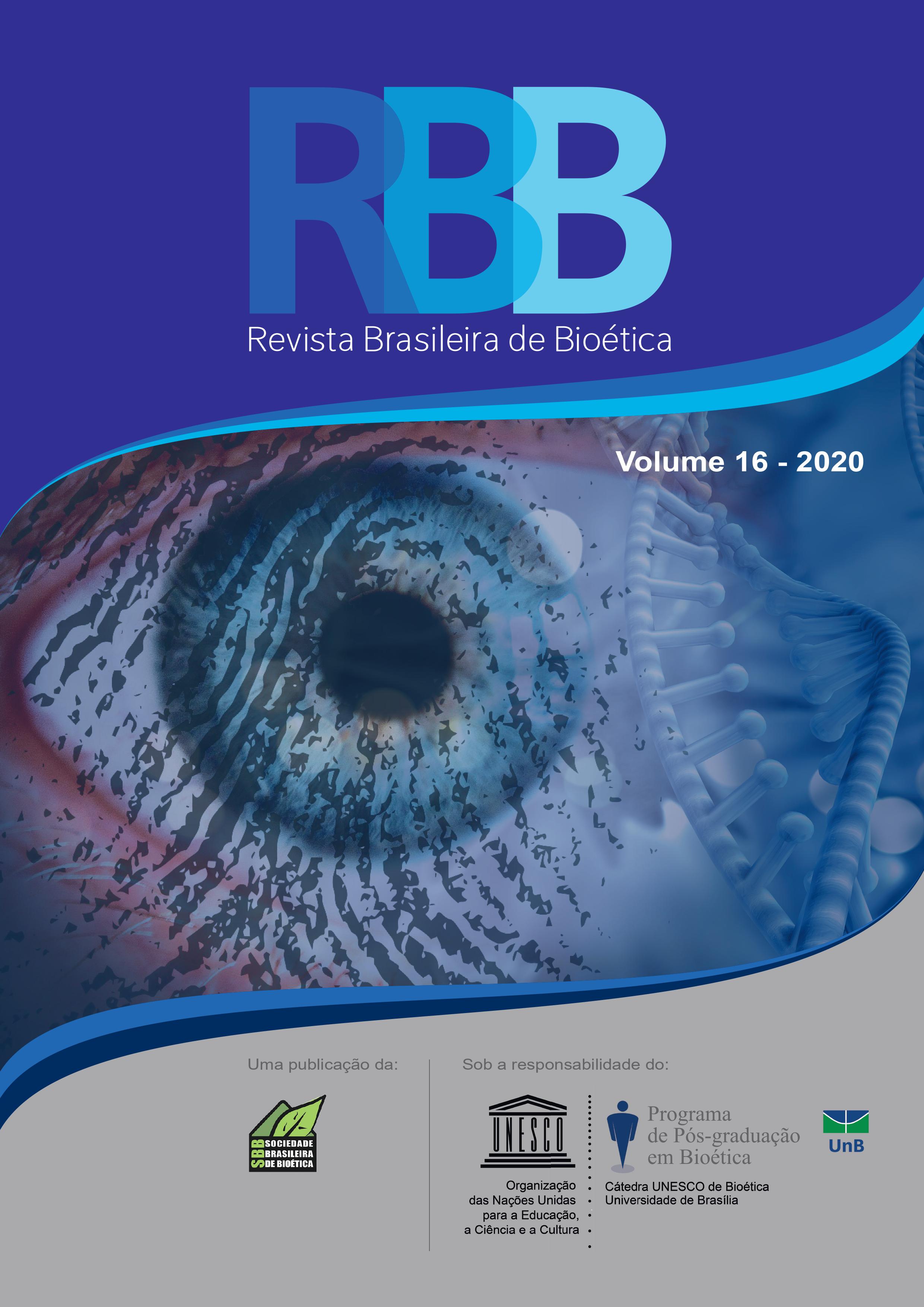Misfortune caused by death, personal identity and what matters in survival
DOI:
https://doi.org/10.26512/rbb.v16.2020.28300Palavras-chave:
Morte. Identidade pessoal, Animalismo. Neo-Lockeanismo. SobrevivênciaResumo
Este artigo apresenta e discute conceitos e argumentos
encontrados em debates sobre três problemas filosóficos: o
infortúnio infligido pela morte a quem morre; identidade pessoal; e o
que é importante para a sobrevivência. Em primeiro lugar, delineia o
debate suscitado no argumento de Epicuro, para quem a morte nada
significa para os que morrem. Em segundo lugar, é apresentada e
discutida a rivalidade entre neo-lockeanos e animalistas em relação
ao critério mais plausível de identidade pessoal. Por fim, é feita uma
discussão sobre se o infortúnio causado pela morte está ou não
relacionado à identidade pessoal. O artigo conclui que a dimensão do
infortúnio causado pela morte depende tanto da quantidade de bens
de que se é privado pela morte quanto do interesse que tal indivíduo
teria de continuar vivendo. Os problemas filosóficos mencionados
constituem um núcleo de questões agudas, como as decisões a
respeito da manutenção da vida e do adiamento da morte.
Referências
Agostinho S. Confissões. Coleção Os Pensadores. São Paulo: Editora Abril, 1973.
Baker LR. Why constitution is not identity. The Journal of Philosophy 1997; 94(12): 599-621.
Blatti S. Animalism, dicephalus, and borderline cases. Philosophical Psychology. 2007; 20(5): 595-608.
Borges JL. Obras completas. 1923-1972. Buenos Aires, Emecé Editores, 1974.
Bourget D, Chalmers DJ. What do philosophers believe? Philosophical Studies 2014.170(3): 465-500.
Bradley, B. The worst time to die. Ethics, 2008; 118(2): 291-314.
Bradley B. Well-Being and death, New York, NY: Oxford University Press, 2009.
Crick F, Koch C. Consciousness and neuroscience. Cerebral Cortex, 1998; 8(2): 97-107.
DeGrazia D. 2005. Human identity and bioethics. New York, NY: Cambridge University Press.
DeGrazia D. The harm of death: Time-Relative Interests, and abortion. The Philosophical Forum, 2007; 38(1): 57-80.
Epicurus. "Letter to Menoeceus." In Epicurus: The Extant Remains, trans. Cyril Bailey. Oxfords: Clarendon Press, 1926.
Garrett B. Personal identity and self-consciousness. New York, NY: Routledge, 1998.
Lewis DK. Survival and identity, Philosophical Papers, v.1, New York, NY: Oxford University Press, 1983. pp. 55-72.
Koch C. Safely switching consciousness off and on again what can we learn about consciousness from anesthetized patients? Scientific American Mind, 2012.
Locke J. An Essay concerning Human Understanding. Oxford: Oxford University Press, 1975.
Martin R, Barresi J. Naturalization of the soul: Self and personal identity in the eighteenth century. London: Routledge, 2000.
McMahan J. Cloning, killing, and identity. Journal of Medical Ethics, 1999; 25(2): 77-86.
McMahan J. The ethics of killing: killing at the margins of life. New York, NY: Oxford University Press, 2002.
Nagel T. Death. Noûs, 1970; 4(1): 73-80.
Noonan HW. Animalism versus lockeanism: Reply to Mackie. Philosophical Quarterly, 2001; 51(202): 83-90.
Noonan HW. Personal identity. 2 ed. New York, NY: Routledge, 2003.
Olson ET. The human animal - Personal Identity Without Psychology. New York, NY: Oxford University Press New York, 1997.
Olson ET. Animalism and the corpse problem. Australasian Journal of Philosophy, 2004; 82(2): 265-74.
Parfit D. Persons and reasons. Oxford: Oxford University Press, 1984.
Parfit D. The unimportance of identity. In Identity, ed. H. Harris, 13-45. Oxford: Oxford University Press, 1995.
Persson I. Our identity and the separability of persons and organisms. Dialogue, 1999; 38(3): 519-534.
Reid T. Essays on the intellectual powers of Man, Edinburgh: Edinburgh University Press, 2002.
Silverstein HS. The evil of death. The Journal of Philosophy, 1980; 77(7): 401-424.
Shoemaker S. Brown-Brownson revisited. The Monist, 2004; 87(4): 573-593.
Shoemaker S. Persons and their pasts. American Philosophical Quarterly, 1970; 7(4): 269-285.
Shoemaker S. Personal identity: a materialist account. In: Metaphysics: The Big Questions, ed. Peter Van Inwagen; Dean W. Zimmerman, 296-310. New York: Wiley-Blackwell, 1998.
Shoemaker S. Self-knowledge and self-identity. Ithaca: Cornell University Press, 1963.
Slater MH. Introduction: Framing the problems of time and identity. In Time and Identity, ed. J. K. Campbell, M. O’Rourke, H.S. Silverstein, 1-24. Cambridge MA: The MIT Press, 2010.
Soll I. On the purported insignificance of death. In Death and Philosophy, ed. J. Malpas, 20-34. London and New York: Routledge, 1998.
Wiggins D. Locke, Butler and the stream of consciousness: and Men as a Natural Kind. Philosophy, 1976; 51(196): 131-158.
Williams B. The self and the future. The Philosophical Review, 1970; 79(2): 161-180.
Downloads
Publicado
Edição
Seção
Licença
Copyright (c) 2020 Revista Brasileira de Bioética

Este trabalho está licenciado sob uma licença Creative Commons Attribution-NonCommercial-ShareAlike 4.0 International License.



